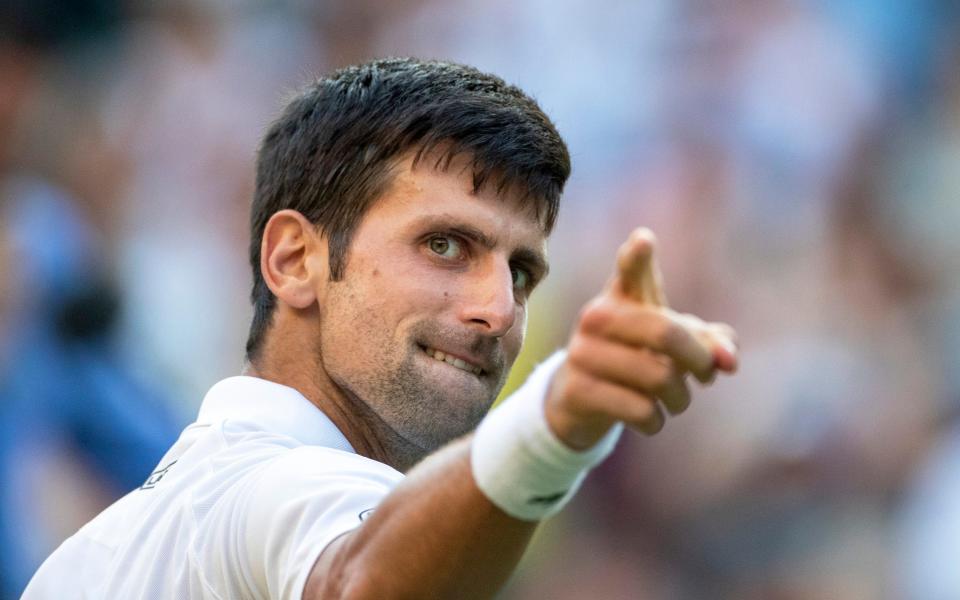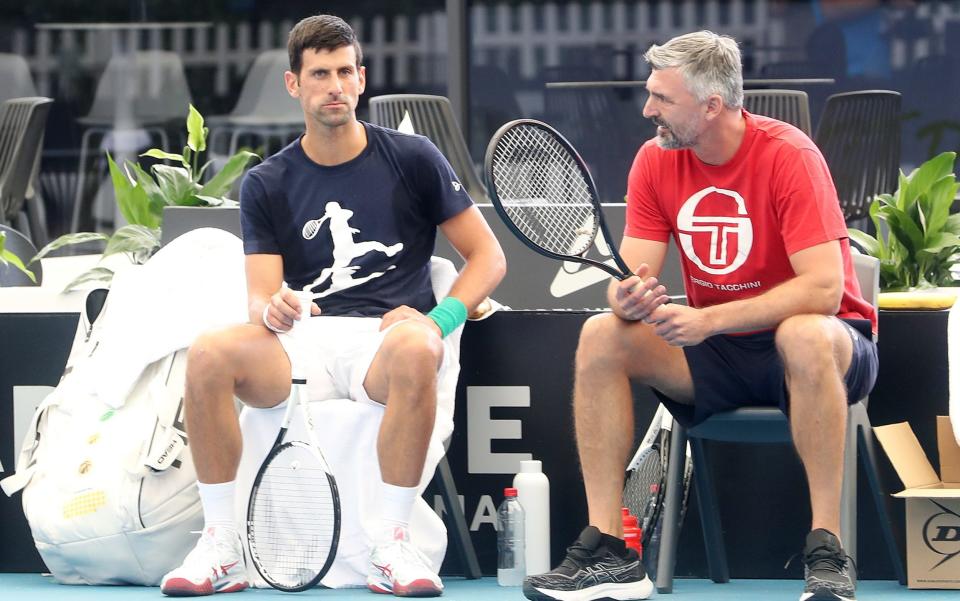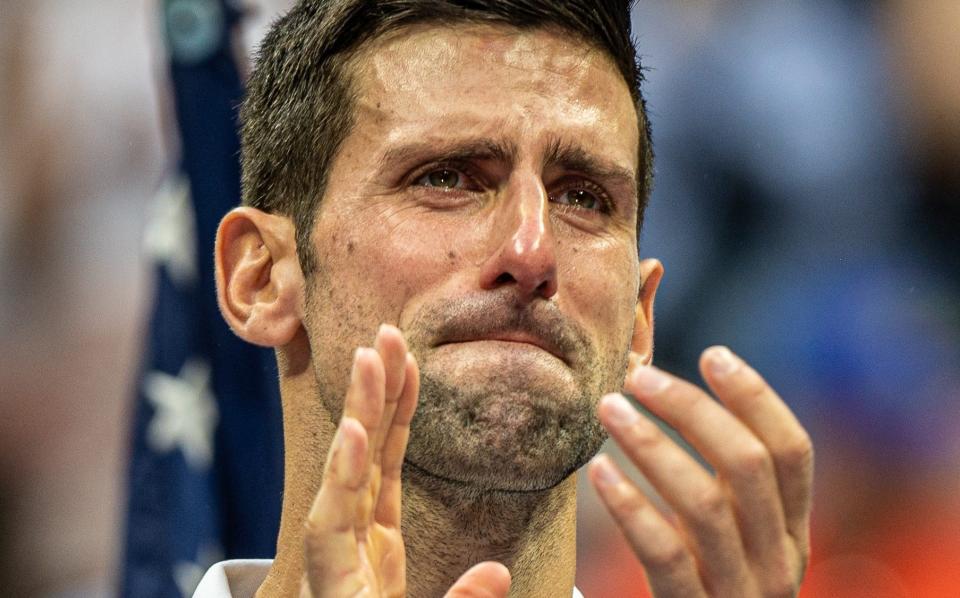Can Djokovic finally win over Wimbledon?

Novak Djokovic marinated in the applause for a moment longer than usual after his Roland-Garros final on Sunday. He had, after all, just made history: a record-breaking 23rd grand slam title, breaking Rafael Nadal’s total of 22. It was completed in customary direct Djokovic style, to put the debate about who is the finest player of all time to bed at last.
As The Telegraph’s tennis correspondent Simon Briggs wrote from Paris: “Whatever feats await this supreme champion, we will remember June 11 2023 as the end of a decade-long argument between tennis’s greatest generation.”
So Djokovic, in a jacket emblazoned with the number “23”, was entitled to revel in glory for a while. Before the trophy presentation, which he conducted with customary grace and quiet self-satisfaction, he sat in his chair and shut his eyes, smiling at nothing in particular.
And then he was off, ready for the next grand slam. The journalists all wanted him to look back, to define his place in history and perhaps offer a crumb as to when this 36 year-old might put away his racket for good. “If I’m winning slams, why even think about ending the career that already has been going on for 20 years?” he said. “I look forward already to Wimbledon.”
Djokovic and his family – his wife, Jelena, and children Stefan, eight, and five-year-old Tara – will likely move into a large rental home in Wimbledon within a week or two, ready for the tournament, which begins on July 3. Tennis players often name whatever grand slam they’re playing in next as their “favourite tournament”, but in Djokovic’s case, his love for Wimbledon seems genuine.
As a child born in what was then Yugoslavia, he used to dream about winning it. When he finally did, in 2011, he knelt down and ate a tuft of grass. “I felt like an animal. I wanted to see how it tastes,” he later said. “It tastes good.” So good he’s won it six more times since.

Yet, for all Djokovic’s success at the All England Club, there has always been a question over how much his love for the place is requited. Not for nothing is “Why is Djokovic not liked at Wimbledon?” a query Google thinks you might be asking when you search his name and the tournament. Djokovic has always been a divisive figure in tennis; in SW19, the most genteel of postcodes, he’s closer to a pantomime villain.
The crowd has been known to cheer when he loses points and support whoever his opponent is regardless of who they are (he has said when people used to chant for Federer he would just pretend they were saying his name, hearing “Novak” instead of “Roger”). It’s not the first time Wimbledon has proved a tough crowd – John McEnroe could not be serious for a while, but got there in the end. Murray, after some grumpy moments as a teenager, won them over too – and now returns a hero.
So can Djokovic win over SW19?
Djokovic, who grew up in the shadow of war near Serbia’s border with Kosovo, slipped into the upper echelon of tennis at the end of the 2000s, breaking up the Federer-Nadal rivalry that Wimbledon crowds so adored. The two Europeans were seen as gentlemen, pin-ups whose humility and quietness off the court matched their energy on it. It was Blur vs Oasis but with better tans: you were one or the other.
The other was Djokovic, an elastic scrap of a man with a shoe brush for hair and a playing style that would come to be defined as much by never-say-die defence as brilliant attack. He was “the Third Man”, and ruined the fun for “Fedal” fans. Later, when he would play Andy Murray, the hometown (well, south west London via Dunblane) hero, in Wimbledon finals, he was even more of a baddie.
He also truly didn’t care: in the early days, “The Djoker” would impersonate his rivals’ playing tics – Nadal picking at his wedgie, Federer’s prancy little run, Andy Roddick’s fidgety serve – in training sessions, could be fluently obstinate in five languages, and in an attempt to avoid the injuries that plagued his early career, tried any experimental therapy going.

“Djokob----”, other players used to call him, when he broke through. “I think he’s a joke,” Federer, himself in a rare moment of b----iness, said in 2007. The following year, Djokovic’s mother, Dijana, would declare “The king is dead, long live the king”, when her son beat Federer and looked set to replace him as world No 1. Later, when on-court tantrums, umpire disputes and crowd goading entered Djokovic’s game, the haters grew louder. “I’d like to see him show a bit more humility, like Nadal and Federer,” Roy Emerson, the Australian former champion, said in 2011. “There is too much of this chest thumping and roaring when he wins.”
But if one of Djokovic’s capabilities is to forget, another is to waste absolutely no energy trying to win over his critics – he would rather win matches. It means he isn’t interested in anybody who finds his gluten-bashing, hyperbaric-chamber-dwelling routines a bit much.
Nor did “NoVaxx” (this is a man with a lot of nicknames) ever give in when his committed opposition to being vaccinated against Covid saw him miss one major and two Masters events. And recently, when he found controversy again by scrawling the words “Kosovo is the heart of Serbia, stop the violence” on a camera at Roland-Garros, he ignored the noise, said the drama had fuelled him further, and simply won the tournament.
Even his usual method of victory sounds particularly uncharitable, when explained by others. Roddick famously said of Djokovic that “first he comes for your legs, and then he comes for your soul”. His current coach, Goran Ivanisevic, expanded on that on Sunday: “Then he digs your grave and you have a funeral and you’re dead. Bye-bye. Thank you for coming.” Compliments, all.
He is booed often. In Paris recently, the crowd were displeased by him taking medical breaks. At Wimbledon last year, some spectators were offended by him blowing a kiss at a loud Cameron Norrie fan after he beat the British No 1 in the semi-final. The first of those incidents earned a passionate defence from McEnroe, who knows a thing or two about a crowd turning on you.

“Let’s be real. That’s what he’s been battling his whole career; inspiring and pushing him. It ends up that it actually helped him, in a weird way. So as an athlete, if you had a choice between love or respect, you’d love to have both. You’d rather have respect,” McEnroe said in commentary during the 2019 Wimbledon final.
Tellingly, the man so often depicted as unfeeling and robotic received his career-best crowd reaction when he finally showed human frailty. In 2021, when Djokovic lost the US Open final to Daniil Medvedev, and in doing so lost the chance for a calendar sweep of majors, spectators in the Arthur Ashe stadium in New York were sympathetic to his clear anguish, roaring him on in the latter stages. When they chanted his name, he wasn’t imagining it.
“Even though I have not won the match, my heart is filled with joy and I am the happiest man alive because you guys made me feel very special on the court,” he said in a tearful interview afterwards.
But if the New York crowd is hostile, the Wimbledon crowd is discerning. It enjoys being charmed over strawberries and cream, not just entertained, and thinks of itself as refined. It knows what it likes and likes what it knows. This year there will be another British hopeful to get behind: Cameron Norrie, who is edging into the public’s affection with every tournament.
And then there’ll be the favourite, Djokovic. The last of the “big four” still at the top of his game. Officially the greatest of all time, on paper at least. They might never love him, but they definitely respect him by now.

